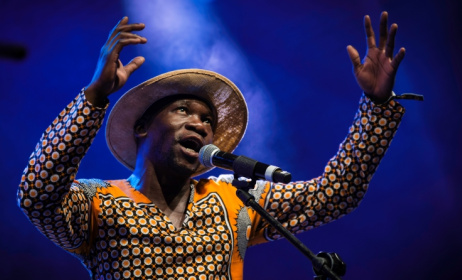Study: Music Industries in Africa
This preliminary study of Africa’s music industries (attached below) identifies the state, nature and structures of African music business and outlines connections between African countries and their former colonising countries, vis-à-vis music professionals and companies.
 Blick Bassy is one of the participants of the study.
Blick Bassy is one of the participants of the study.
The research methodology combines a literature review of music industry reports and peer-reviewed articles with exploratory interviews with the following music professionals:
- Max Alphonse Gapher – Content creator, AfroVibes Media Group
- Blick Bassy – Cameroonian musician, writer and producer for BB Prod label
- Nothando Migogo – CEO, Southern African Music Rights Organisation
- Ben Oldfield – The Orchard’s Vice President of France, Benelux and West Africa
- Kalin Pashaliev – Editor-in-chief, Music In Africa
Note that the statements made by the interviewees in this research paper are commentary and personal points of view.
The purpose of this research is to provide a better understanding of the African music industries, illustrated by the lack of data on the continent within major trade reports, such as those released by the International Federation of the Phonographic Industry (IFPI).
According to author Dave Laing (2014), who specialises in the history and development of pop and rock music, limited understanding of non-Western countries, including most African countries besides South Africa, is reflected in trade reports by organisations like IFPI, which include minimal data on the continent.
What is actually happening in Africa? Why is a continent that originated or influenced most, if not all musical genres not given due attention? This research on Africa’s music industries addresses these questions and others, such as the challenge of piracy, a historical 'solution' to a lack of music access that results in revenue losses. Authors and music professionals generally agree that the African continent represents a huge potential music market, especially in the streaming era. This has attracted both companies on the continent as well as foreign investment, as international companies seize opportunities for exponential growth. Universal, Warner Music Group, and Sony Music, for example, have recently established offices throughout the continent. Other growth opportunities include the rise in smartphone ownership, Internet access and community radio broadcasting.
Insufficient intellectual property protection, government regulation and music industry education all represent significant challenges to music industry growth, as does the tremendous diversity among African countries. Highly developed industries in South Africa and Nigeria co-exist with many in their early developmental stages. Finally, many African countries are defined by conflict, which impacts all industries, including the music business.
This paper concludes with a discussion of main findings and recommendations for future actions to ensure the success and sustainability of the music industries across the continent.



































Comments
Log in or register to post comments